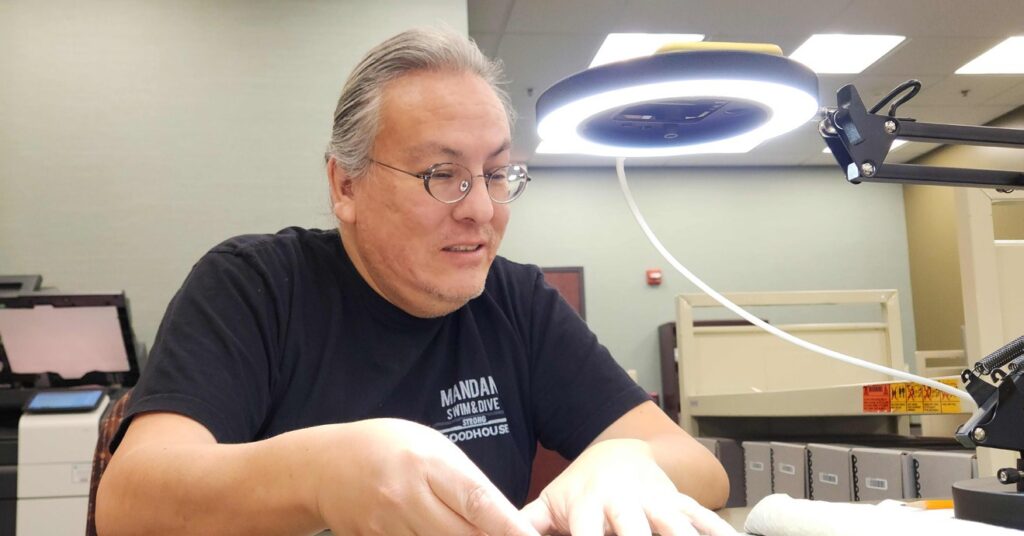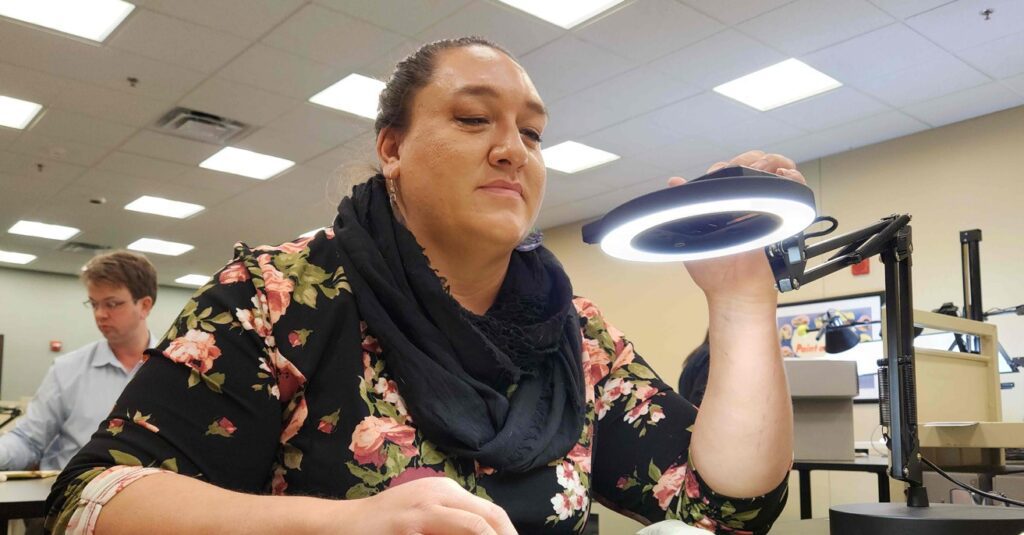Digitization project underway of Bismarck Indian School documents

Researcher/historian Dakota Goodhouse (Standing Rock) digitizing Bismarck Indian School records Jan. 3, 2025 at the Kansas City National Archive. (Dennis J. Neumann photo)
BISMARCK – Work is underway on a research project that promises to make it easier to access the historical records of a Native American residential boarding school that once operated at Bismarck, North Dakota.
During the first week of January, a group of researchers spent two days at the National Archives at Kansas City, Missouri, digitizing papers and records from Bismarck Indian School. It was the second such trip by researchers from North Dakota to the government facility that holds records from federal agencies throughout the region.
The Bismarck Indian School collection has many thousands of documents. The school was operated by the U.S. Bureau of Indian Affairs from 1907 to 1937. The majority of its students were from Indian Reservations in North Dakota, including Standing Rock, Fort Berthold-Three Affiliated (now MHA Nation), Turtle Mountain, and Spirit Lake.
Early in the Process
Until now, the holdings have been accessible only by traveling hundreds of miles to Kansas City and scheduling time to search through numerous boxes and folders. This multi-phase project aims to repatriate the records – bring them back to the place of their origin – by digitizing and making them available electronically. The work is sponsored by the Northern Plains Heritage Foundation and the Missouri Valley Heritage Alliance-Fort Abraham Lincoln Foundation; in partnership with Nueta, Hidatsa, Sahnish College, New Town, ND; and United Tribes Technical College, Bismarck, ND.

Prairie Rose Seminole (MHA Nation) is the main contact for information about the Bismarck Indian School Digital Repatriation Project; here digitizing records Jan. 3, 2025 at the Kansas City National Archive. (Dennis J. Neumann photo)
“We’re very early in the process,” said Prairie Rose Seminole (MHA Nation) Northern Plains Heritage Foundation projects coordinator. “The work is tedious and deliberate, and it’ll take several years to digitize the entire collection.”
Glimpse of Content
Included in the Bismarck Indian School collection are financial records and reports, official correspondence, personnel and staff information, and student records and correspondence. All hold the promise of revealing undiscovered truths about the residential boarding school experience.
What caught the eye of researcher Dakota Goodhouse among the papers digitized in January was evidence of unsafe conditions for students who were allowed to wander unsupervised onto the nearby Northern Pacific Railroad tracks and the rail bridge across the Missouri River.
“Student safety is what stood out to me,” said Goodhouse, a history instructor at United Tribes Technical College who has written and presented about the boarding school. “These were impressionable youngsters, just kids, who were unsupervised and their safety apparently neglected. It calls into question how the institution was run.”
Access/Community Engagement
Knowing the negative impact of residential boarding schools, the planners of this project are working to ensure the materials are preserved with respect and made accessible in ways that honor the stories and experiences they represent.
“We’re working closely with cultural advisors, community members, historians and archivists,” said Seminole. “Our priorities are education, healing, and respect for descendants and the affected communities.”
As the project proceeds, details will be released about community engagement, how to access records, and protocols for working with the materials.
For more information, please contact Prairie Rose Seminole, at the Northern Plains Heritage Foundation: Prairierose@northernplainsheritage.org
The post Digitization project underway of Bismarck Indian School documents first appeared on Native Sun News Today.
Tags: More News
